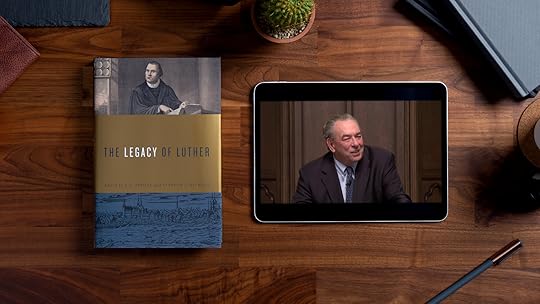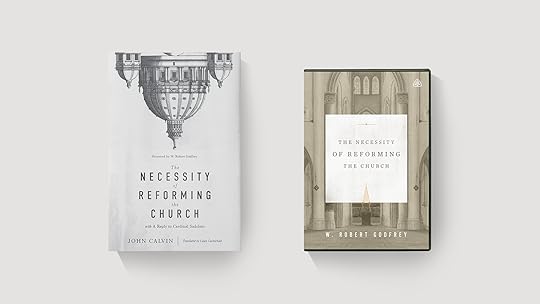R.C. Sproul's Blog, page 50
October 29, 2020
True Theology
Here’s an excerpt from True Theology, Burk Parsons' contribution to the October issue of Tabletalk:
In a sermon on Hebrews 8:10 published on October 31, 1912, the English Baptist pastor Charles Haddon Spurgeon declared: “The doctrine of the divine covenant lies at the root of all true theology. It has been said that he who well understands the distinction between the covenant of works and the covenant of grace is a master of divinity. I am persuaded that most of the mistakes which men make concerning the doctrines of Scripture are based upon fundamental errors with regard to the covenants of law and of grace.” Spurgeon was exactly right, and just as the church at the beginning of the twentieth century needed to hear his words, the church in the twenty-first century desperately needs to hear them as well. The church in our day has largely forgotten, ignored, or denied many of the tenets of covenant theology. But to understand the unity of God’s Word rightly, we must understand covenant theology accurately.
Continue reading True Theology, or begin receiving Tabletalk magazine by signing up for a free 3-month trial.
For a limited time, the new TabletalkMagazine.com allows everyone to browse and read the growing library of back issues, including this month’s issue.


October 28, 2020
Stream for Free: Always Ready

All of the messages from Always Ready, our online event to help young Christian students defend their faith, are now available for free on Ligonier.org, the Ligonier app, and YouTube.
Sessions:
Why Apologetics? by Nathan W. Bingham
Is Christ Really the Only Way? by Stephen Nichols
How Can a Loving God Allow Evil? by Burk Parsons
Is the Bible Still Relevant? by Joel Kim
What Is Truth? by Eric Bancroft
Questions & Answers with Stephen Nichols
Share these messages with the young people in your life or the youth at your church to help them share their faith and stand firm for the truth of God’s Word.


Four Implications of Martin Luther’s Theology

What do the sovereignty of God, salvation by grace, justification by faith, and new life in union with Christ mean for the living of the Christian life? For Martin Luther, they carry four implications:
The first implication is the knowledge that the Christian believer is simul iustus et peccator, at one and the same time justified and yet a sinner. This principle, to which Luther may have been stimulated by John Tauler's Theologia Germanica, was a hugely stabilizing principle: in and of myself, all I see is a sinner; but when I see myself in Christ, I see a man counted righteous with His perfect righteousness. Such a man is therefore able to stand before God as righteous as Jesus Christ—because he is righteous only in the righteousness that is Christ's. Here we stand secure.
The second implication is the discovery that God has become our Father in Christ. We are accepted. One of the most beautiful accounts found in Luther's Table Talk was, perhaps significantly, recorded by the somewhat melancholic, yet much loved, John Schlaginhaufen:
God must be much friendlier to me and speak to me in friendlier fashion than my Katy to little Martin. Neither Katy nor I could intentionally gouge out the eye or tear off the head of our child. Nor Could God. God must have patience with us. He has given evidence of it, and therefore he sent his Son into our flesh in order that we may look to him for the best.
Third, Luther emphasizes that life in Christ is necessarily life under the cross. If we are united to Christ, our lives will be patterned after His. The way for both the true church and the true Christian is not via the theology of glory (theologia gloriae) but via the theology of the cross (theologia crucis). This impacts us inwardly as we die to self and outwardly as we share in the sufferings of the church. The medieval theology of glory must be overcome by the theology of the cross. For all their differences in understanding the precise nature of the sacraments, Luther and Calvin are at one here. If we are united with Christ in His death and resurrection, and marked out thus by our baptism (as Paul teaches in Rom. 6:1–14), then the whole of the Christian life will be a cross-bearing:
The Cross of Christ doth not signify that piece of wood which Christ did bear upon his shoulders, and to the which he was afterwards nailed, but generally it signifieth all the afflictions of the faithful, whose sufferings are Christ's sufferings, 2 Cor. i.5: "The sufferings of Christ abound in us"; again: "Now rejoice I in my sufferings for you, and fulfil the rest of the afflictions of Christin my flesh, for his body's sake, which is the Church". (Col. i.24). The Cross of Christ therefore generally signifieth all the afflictions of the Church which it suffereth for Christ.
The believer's union with Christ in His death and resurrection and its outworking in daily experience thus became, for Luther, the spectacle lenses through which the Christian learns to view every experience in life. This—the theologia crucis—is what brings everything into sharper focus and enables us to make sense of the ups and downs of the Christian life:
It is profitable for us to know these things, lest we should be swallowed up with sorrow or fall to despair when we see that our adversaries do cruelly persecute, excommunicate and kill us. But let us think with ourselves, after the example of Paul that we must glory in the cross which we bear, not for our sins, but for Christ's sake. If we consider only in ourselves the sufferings which we endure, they are not only grievous but intolerable; but when we may say: "Thy sufferings (O Christ) abound in us"; or, as it is said in Psalm xliv: "For thy sake we are killed all the day," then these sufferings are not only easy, but also sweet, according to this saying: "My burden is easy, and my yoke is sweet" (Matt. xi.30).
Fourth, the Christian life is marked by assurance and joy. This was one of the hallmarks of the Reformation, and understandably so. The Reformation's rediscovery regarding justification—that, instead of working toward a hoped-for arrival at it, the Christian life actually begins with it—brought stunning deliverance, filling mind, will, and affections with joy. It meant that one could now begin to live in the light of a settled future in glory. Inevitably, that light reflected back into the present life, bringing intense relief and release.
For Luther, the Christian life is a gospel-grounded, gospel-built, gospel-magnifying life that exhibits the free and sovereign grace of God and is lived out in gratitude to the Savior who died for us, yoked to Him in cross-bearing until death is swallowed up in victory and faith becomes sight.
Perhaps, in 1522, as they sat listening to Luther preaching one Sunday in the church at Borna, some of his congregation wondered what lay at the heart of this gospel that had so excited, not to say transformed, Brother Martin. Could it possibly be for them too? Luther had read their minds. He had come into the pulpit well prepared to answer their question:
But what is the Gospel? It is this, that God has sent his Son into the world to save sinners, Jn. 3, 16, and to crush hell, overcome death, take away sin and satisfy the law. But what must you do? Nothing but accept this and look up to your Redeemer and firmly believe that he has done all this for your good and freely gives you all as your own, so that in the terrors of death, sin and hell, you can confidently say and boldly depend upon it, and say: Although I do not fulfil the law, although sin is still present and I fear death and hell, nevertheless from the Gospel I know that Christ has bestowed on me all his works. I am sure he will not lie, his promise he will surely fulfil. And as a sign of this I have received baptism.
Upon this I anchor my confidence. For I know that my Lord Christ has overcome death, sin, hell and the devil for my good. For he was innocent, as Peter says: "Who did no sin, neither was guile found in his mouth." 1 Pet. 2, 22. Therefore sin and death were not able to slay him, hell could not hold him, and he has become their Lord, and has granted this to all who accept and believe it. All this is effected not by my works or merits; but by pure grace, goodness and mercy.
Luther once said, "If I could believe that God was not angry at me, I would stand on my head for joy." Perhaps that very day some of those who heard him preach responded and experienced the "confidence" of which he spoke. Who knows but some of the younger hearers later wrote to their friends in turn and told them that they had gone home and stood on their heads for joy?
This excerpt is taken from Sinclair Ferguson's contribution in The Legacy of Luther.


October 27, 2020
Enjoy Two Free Reformation Resources

Five centuries ago, Martin Luther nailed his Ninety-Five Theses to the door of the Castle Church in Wittenberg. Today, this German monk is celebrated as the man used by God to redirect Christian history and recover the truth of God’s Word. His legacy has unrelentingly endured for five hundred years—but why?
This week, we want to give you two free Reformation resources that can help you get to know Luther’s life, teaching, and enduring influence. Request your digital download of R.C. Sproul’s ten-part video teaching series Luther and the Reformation plus the ebook The Legacy of Luther, edited by R.C. Sproul and Stephen Nichols. Discover what led Martin Luther to make a courageous stand for the gospel in the sixteenth century, and be encouraged to stand for the truth of God’s Word today.
CLAIM YOUR TWO FREE RESOURCES
This offer expires October 31, 2020


Cherishing and Defending the Old Testament
Here’s an excerpt from Cherishing and Defending the Old Testament, Matthew H. Patton's contribution to the October issue of Tabletalk:
When you invite folks to dinner, there are certain rooms you hope they won’t see because there wasn’t enough time to clean everywhere. Similarly, for many Christians, the Old Testament is not a gem to show off but a closet of problems that we hope our unbelieving friends won’t see or ask us about. But what if the Old Testament is actually one of our greatest treasures? What if some of its most problematic parts are actually part of its glory? In this article, we will step through several objections to the Old Testament and show how these issues actually point us to the glory of Christ.
Continue reading Cherishing and Defending the Old Testament, or begin receiving Tabletalk magazine by signing up for a free 3-month trial.
For a limited time, the new TabletalkMagazine.com allows everyone to browse and read the growing library of back issues, including this month’s issue.


October 26, 2020
One Week Only: Save on a Reformation Resource Bundle

The church reached a turning point in the sixteenth century. Worship had become a spectacle, doctrine was distorted, and ministers lived in immorality. To restore the church to the teachings of Christ, Reformers such as John Calvin cried out for a return to God’s authoritative Word. This work of reformation was too urgent to be delayed, for the gospel itself was at stake.
This week only, save when you preorder The Necessity of Reforming the Church resource bundle. This bundle contains W. Robert Godfrey’s new 6-part DVD teaching series, gathering insights from John Calvin for believers today, plus Calvin’s classic treatise defending the Reformation, newly translated by Dr. Casey Carmichael with a foreword from Dr. Godfrey. Together, these companion resources outline the importance of continuing the work of reformation in our own day.
Preorder the bundle today for only $30 to save more than 35% on both resources and to ensure that you receive them once the book is available in early December. This timeless classic and timely series can help you and your church pursue biblical faithfulness for the glory of God alone. Preorder the bundle by October 31 and save.
If you already own Dr. Godfrey’s teaching series, you can still preorder the new translation of Calvin’s book this week for only $10. Offer ends Saturday, October 31.


Why Do Some Christians Use the Westminster Confession While Others Use the Three Forms of Unity?

While the Reformers were united in their commitment to Scripture, their application of the Bible’s theology took on different forms. From one of our Ask Ligonier events, Stephen Nichols surveys the unity and diversity seen in the Reformed confessions of faith.
Do you have a biblical or theological question? We invite you to ask Ligonier.
Read the Transcript


What Is Reformation Day?

A single event on a single day changed the world. It was October 31, 1517. Brother Martin, a monk and a scholar, had struggled for years with his church, the church in Rome. He had been greatly disturbed by an unprecedented indulgence sale. The story has all the makings of a Hollywood blockbuster. Let’s meet the cast.
First, there is the young bishop—too young by church laws—Albert of Mainz. Not only was he bishop over two bishoprics, he desired an additional archbishopric over Mainz. This, too, was against church laws. So Albert appealed to the pope in Rome, Leo X. From the De Medici family, Leo X greedily allowed his tastes to exceed his financial resources. Enter the artists and sculptors, Raphael and Michelangelo.
When Albert of Mainz appealed for a papal dispensation, Leo X was ready to deal. Albert, with the papal blessing, would sell indulgences for past, present, and future sins. All of this sickened the monk Martin Luther. Can we buy our way into heaven? Luther had to speak out.
But why October 31? November 1 held a special place in the church calendar as All Saints’ Day. On November 1, 1517, a massive exhibit of newly acquired relics would be on display at Wittenberg, Luther’s home city. Pilgrims would come from all over, genuflect before the relics, and take hundreds, if not thousands, of years off time in purgatory. Luther’s soul grew even more vexed. None of this seemed right.
Martin Luther, a scholar, took quill in hand, dipped it in his inkwell and penned his Ninety-Five Theses on October 31, 1517. These were intended to spark a debate, to stir some soul-searching among his fellow brothers in the church. The Ninety-Five Theses sparked far more than a debate. The Ninety-Five Theses also revealed the church was far beyond rehabilitation. It needed a reformation. The church—and the world—would never be the same.
One of Luther’s Ninety-Five Theses simply declares, “The Church’s true treasure is the gospel of Jesus Christ.” That alone is the meaning of Reformation Day. The church had lost sight of the gospel because it had long ago papered over the pages of God’s Word with layer upon layer of tradition. Mere tradition often brings about systems of works, of earning your way back to God. It was true of the Pharisees, and it was true of medieval Roman Catholicism. Didn’t Christ Himself say, “My yoke is easy and My burden is light”? Reformation Day celebrates the joyful beauty of the liberating gospel of Jesus Christ.
What is Reformation Day? It is the day the light of the gospel broke forth out of darkness. It was the day that began the Protestant Reformation. It was a day that led to Martin Luther, John Calvin, John Knox, and many other Reformers helping the church find its way back to God’s Word as the only supreme authority for faith and life and leading the church back to the glorious doctrines of justification by grace alone, through faith alone, in Christ alone. It kindled the fires of missionary endeavors, it led to hymn writing and congregational singing, and it led to the centrality of the sermon and preaching for the people of God. It is the celebration of a theological, ecclesiastical, and cultural transformation.
So we celebrate Reformation Day. This day reminds us to be thankful for our past and to the monk turned Reformer. What’s more, this day reminds us of our duty, our obligation, to keep the light of the gospel at the center of all we do.


October 25, 2020
What Is Reformation Day?

A single event on a single day changed the world. It was October 31, 1517. Brother Martin, a monk and a scholar, had struggled for years with his church, the church in Rome. He had been greatly disturbed by an unprecedented indulgence sale. The story has all the makings of a Hollywood blockbuster. Let's meet the cast.
First, there is the young bishop—too young by church laws—Albert of Mainz. Not only was he bishop over two bishoprics, he desired an additional archbishopric over Mainz. This too was against church laws. So Albert appealed to the Pope in Rome, Leo X. From the De Medici family, Leo X greedily allowed his tastes to exceed his financial resources. Enter the artists and sculptors, Raphael and Michelangelo.
When Albert of Mainz appealed for a papal dispensation, Leo X was ready to deal. Albert, with the papal blessing, would sell indulgences for past, present, and future sins. All of this sickened the monk, Martin Luther. Can we buy our way into heaven? Luther had to speak out.
But why October 31? November 1 held a special place in the church calendar as All Saints' Day. On November 1, 1517, a massive exhibit of newly acquired relics would be on display at Wittenberg, Luther's home city. Pilgrims would come from all over, genuflect before the relics, and take hundreds, if not thousands, of years off time in purgatory. Luther's soul grew even more vexed. None of this seemed right.
Martin Luther, a scholar, took quill in hand, dipped it in his inkwell and penned his 95 Theses on October 31, 1517. These were intended to spark a debate, to stir some soul-searching among his fellow brothers in the church. The 95 Theses sparked far more than a debate. The 95 Theses also revealed the church was far beyond rehabilitation. It needed a reformation. The church, and the world, would never be the same.
One of Luther's 95 Theses simply declares, "The Church's true treasure is the gospel of Jesus Christ." That alone is the meaning of Reformation Day. The church had lost sight of the gospel because it had long ago papered over the pages of God's Word with layer upon layer of tradition. Tradition always brings about systems of works, of earning your way back to God. It was true of the Pharisees, and it was true of medieval Roman Catholicism. Didn't Christ Himself say, "My yoke is easy and my burden is light?" Reformation Day celebrates the joyful beauty of the liberating gospel of Jesus Christ.
What is Reformation Day? It is the day the light of the gospel broke forth out of darkness. It was the day that began the Protestant Reformation. It was a day that led to Martin Luther, John Calvin, John Knox, and many other Reformers helping the church find its way back to God's Word as the only authority for faith and life and leading the church back to the glorious doctrines of justification by grace alone through faith alone in Christ alone. It kindled the fires of missionary endeavors, it led to hymn writing and congregational singing, and it led to the centrality of the sermon and preaching for the people of God. It is the celebration of a theological, ecclesiastical, and cultural transformation.
So we celebrate Reformation Day. This day reminds us to be thankful for our past and to the Monk turned Reformer. What's more, this day reminds us of our duty, our obligation, to keep the light of the gospel at the center of all we do.


October 24, 2020
Did God Choose Which People He Would Save?

The core message of the gospel is that God saves sinners from judgment through His Son Jesus Christ. Scripture further reveals that God saves His people according to His sovereign purpose, a decision He made even before He created the world (Rom. 9:23; Eph. 1:4; Titus 1:2). However, our 2020 State of Theology survey suggests that this teaching, which tends to humble man and exalt God, is rejected by most Christians in America today.
According to the survey, only 38% of professing U.S. evangelicals* now agree with the following statement: “God chose the people he would save before he created the world.” We recently sat down with Ligonier Teaching Fellow Dr. Stephen Nichols to ask him what this response reveals about the church in America.
If God were not absolutely sovereign over the redemption of His people, another precious truth of the gospel would be destroyed—that we are saved by grace alone and not by our works (Eph. 2:8–9). By rejecting the Bible’s teaching about sovereign grace, Christians undermine their own assurance of salvation. We hope the 2020 results from The State of Theology survey will encourage believers to search the Scriptures and discern whether their beliefs are derived more from cultural values or from God’s inspired, inerrant revelation.
* Evangelicals were defined by this survey as people who strongly agreed with the following four statements:
The Bible is the highest authority for what I believe.
It is very important for me personally to encourage non-Christians to trust Jesus Christ as their Savior.
Jesus Christ’s death on the cross is the only sacrifice that could remove the penalty of my sin.
Only those who trust in Jesus Christ alone as their Savior receive God’s free gift of eternal salvation.


R.C. Sproul's Blog
- R.C. Sproul's profile
- 1931 followers



